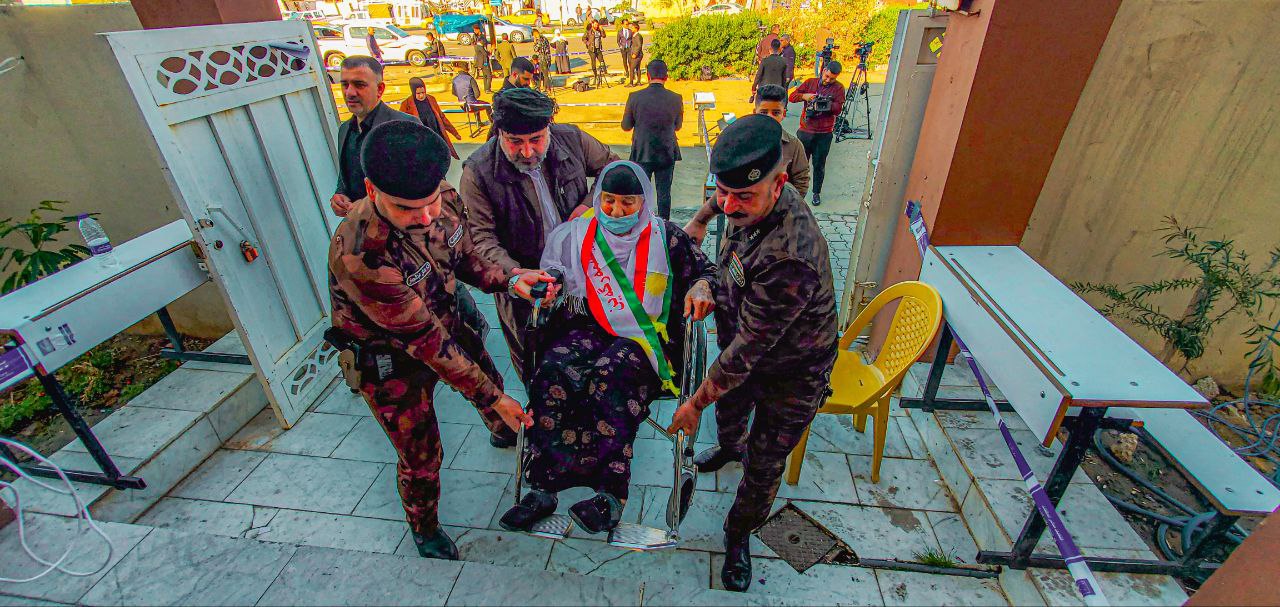While supporters of the two main Kurdish political parties were celebrating in Kirkuk and other disputed territories, the results of counting and sorting votes for the provincial council elections showed that the number of Kurdish seats was declining.
In the Northern, Oil-rich province of Kirkuk, which was the center of the conflict of components, ethnicities, and parties, Kurdish lists and alliances failed to win more than half of the seats in the provincial council as before, and they declined significantly in Nineveh and Diyala, while in Salah al-Din a single candidate won a seat, according to the preliminary results of the elections and the mechanism for distribution of seats according to the Sainte-Lague electoral system.
The Iraqi provincial council elections, including Kirkuk, which was deprived of them for 18 years, took place on December 18, 2023, and one day later, the Independent High Electoral Commission IHEC announced the results of counting 94.4 percent of the votes of the regions and candidates.
Kirkuk: from 63 percent to 47 percent
Kurdish party lists and alliances in Kirkuk won seven seats out of 15 seats in the provincial council, in addition to the Christian quota seat, equivalent to 47 percent of the council seats, while the previous percentage was 63 percent.
Not only in the Provincial Council but since 2003, the Kurds have had more than 50 percent of the seats in all parliamentary elections in Kirkuk.
In the current elections for the Kirkuk Provincial Council, unlike what happened in the 2005 elections, the Kurds could not agree to participate with a unified list but rather entered the competition with five lists and dozens of candidates.
Only two Kurdish lists won seats. The Patriotic Union of Kurdistan PUK and the Kurdistan Communist Party KCP participated in the alliance (Kirkuk, Our Strength, and Our Will) and won five seats after winning 139,373 votes. The Kurdistan Democratic Party KDP also secured two seats with 46,749 votes.
The New Generation Movement with 24,620 votes, the Kirkuk Torch (Kurdistan Islamic Union KIU and Justice Group) with 6,655 votes, and the Kurdistan Socialist Party KSP with 377 votes failed to win any seat.
According to the preliminary results, the total number of seats for the Kurds is seven after garnering about 218,000 votes. On the other hand, the Arabs won six seats and the Turkmens won two seats, in addition to the Christian quota seat.
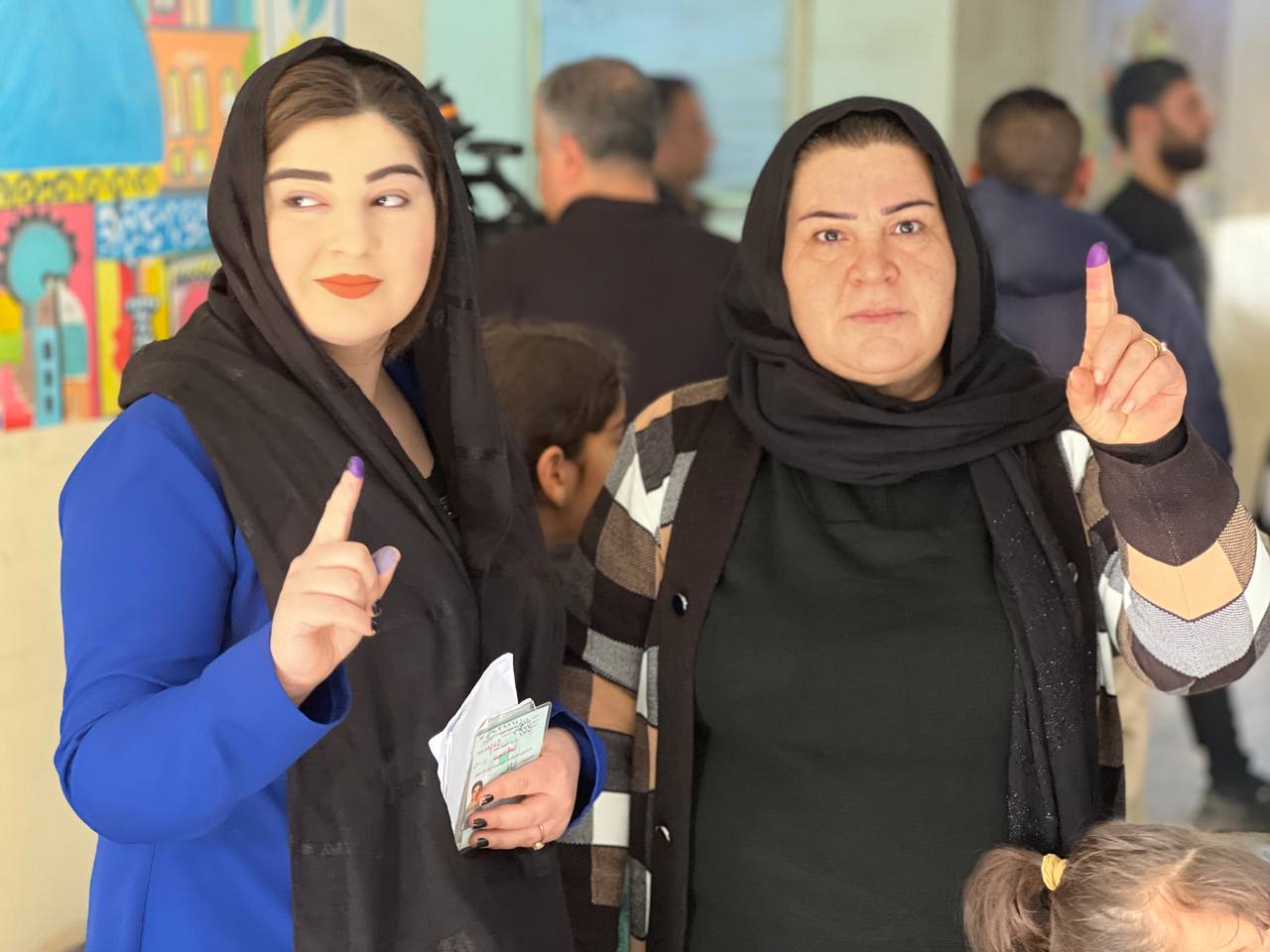
Two Kurdish voters in Daquq District, Kirkuk, December 18, 2023. Muhammad Almass
More than 520,000 Kirkuki voters participated in the elections, i.e. 66 percent, which is close to the percentage recorded in the first provincial council elections that took place in 2005, when it was 68 percent. Kirkuk has not witnessed elections for the Provincial Council since 2005 due to disagreements between Arab, Kurdish, and Turkmen parties over voter records.
In the 2005 elections, the Kurds were unified within the framework of the Fraternity List and succeeded in winning 26 seats out of the total number of seats in the provincial council, which was one seat, equivalent to 63 percent. In contrast, the Turkmen, with their Sunni and Shiite sects, won nine seats, and the Arab component won six seats.
The seats on the Fraternity List were distributed at the time: seven seats for the KDP, five seats for the PUK, three seats each for the KIU and the Kurdistan Communist Party, two seats for candidates from the Arab component, two seats for independent candidates, and one seat each for the Turkmen, the Kurdistan Socialist Party, the Kurdistan Toilers Party, and the Christians.
Until before October 16, 2017, the Kurds in Kirkuk held the position of governor and mayor of several districts and sub-districts. After relations between the federal government and the Kurdistan Regional Government KRG worsened due to the independence referendum and Kirkuk fell under the control of the security forces affiliated with the federal government, the Kurds lost most of their positions.
In Nineveh... they lost their influence
According to the number of seats, the Kurdish parties were the largest force and the decisive voice in distributing positions in the previous session of the Nineveh Provincial Council, but from now on they will not have this position, as they constituted 31 percent of the council, but now they do not reach 24 percent.
The Kurds participated in the elections with four lists and alliances to compete for 26 seats in the Nineveh Provincial Council. The KDP participated in the elections with an independent list, while the PUK entered the competition within the framework of the Nineveh People’s Union alliance with several Arab parties and various components, while the Socialist Party pushed the KDP and the KCP nominated candidates within the framework of the Civil Values Alliance.
Only two lists won seats. The KDP became the second winner after collecting 127,938 votes, which secured it four seats. As for the PUK Alliance, it won two seats with 45,939 votes, while the KSP collected only 923 votes.
The KDP and the PUK together have six seats, according to the preliminary results of the elections, which is equivalent to 23.5 percent of the 26 seats in the Provincial Council (the number of council seats becomes 29 seats, including the quota of Christians, Yazidis, and Shabak seats).
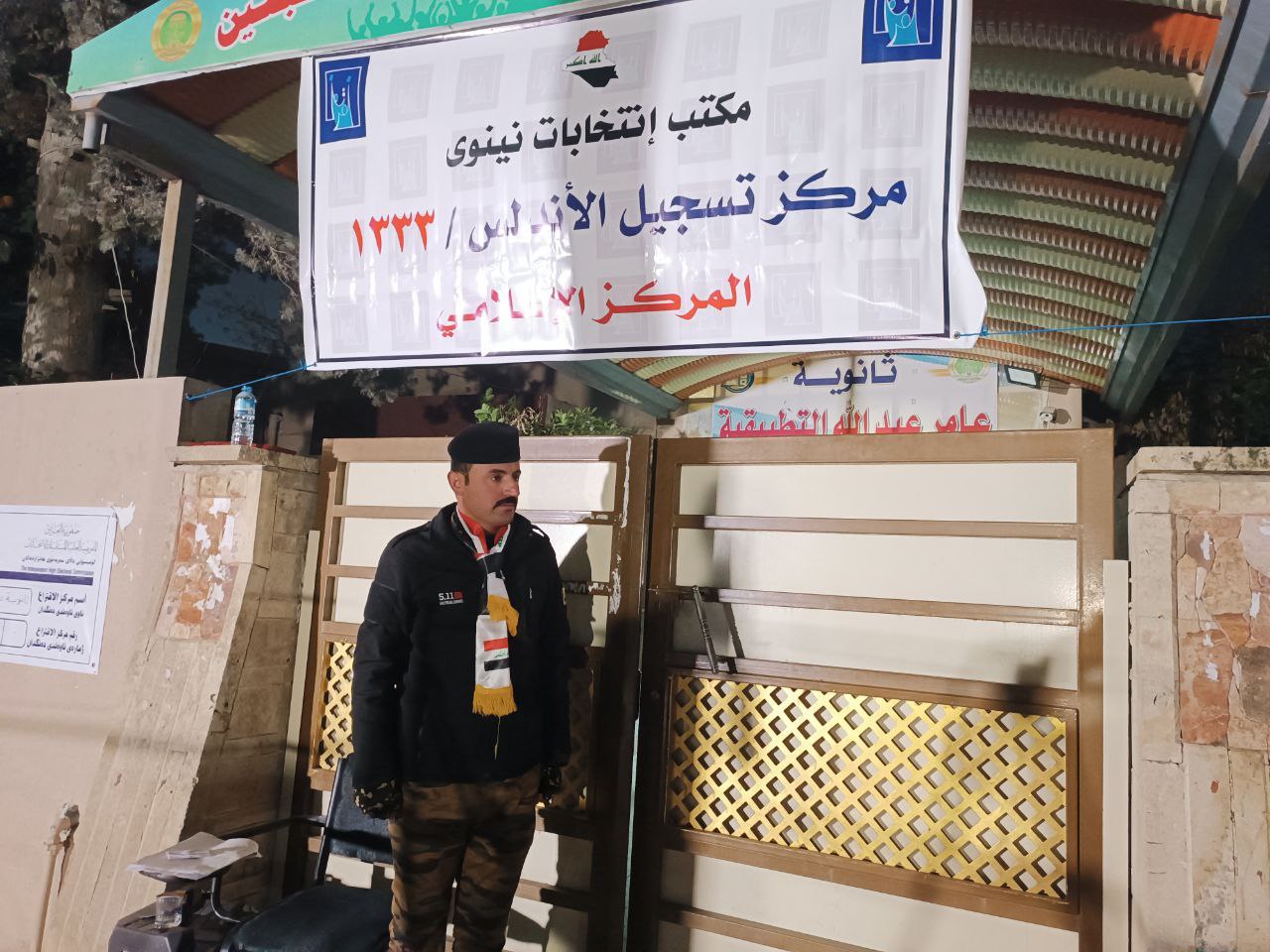
Several Kurdish parties that participated in the previous elections decided not to participate this time, including the Change Movement, the KIU, and the Justice Group.
The total number of Kurdish votes exceeds 174,000 votes, which is close to what was achieved 10 years ago when it reached more than 173,000 votes.
In the previous Nineveh Provincial Council elections held in 2013, the Kurds won 31 percent of the seats, as they participated with a unified list called the Alliance for Fraternity and Coexistence led by the Kurdistan Democratic Party and the Patriotic Union, and secured 11 seats out of a total of 36 seats. (The number of council seats was 39, including the quota for minority seats.)
The Kurds formed the main component and decisive voice in the local government of Nineveh Governorate before its dissolution, and within the framework of the agreement, they assumed the position of Chairman of the Council, Deputy Governor, and several other senior positions.
Diyala seats drop by half
The concerns expressed by the Kurdish parties in Diyala regarding the provincial council elections were also realized as they expected it. The Kurds not only failed to reach the previous number of seats, but their number decreased by half.
The Kurds in Diyala, with all their lists and candidates, won a single seat in the provincial council, which went to the PUK.
Unlike previous election cycles, the Kurds did not ally in these elections, as the KDP, PUK, and the KSP announced independent lists that included 50 candidates, which prompted representatives of those parties, in a previous follow-up to (KirkukNow), to express their fears about the dispersion of Kurdish votes in the Diyala Provincial Council Elections.
Diyala Kurds are spread in the disputed territories of Khanaqin District and its outskirts, where the population of these areas is estimated at 238,000 people, according to statistics from the Central Bureau of Statistics for the year 2019.
In these elections, the Kurds with three lists won about 31,000 votes, more than 24,000 of which were for the PUK and about 7,000 votes for the KDP, and they came in seventh and ninth places.
In the previous Diyala Governorate Council (2013 elections) within the framework of the Fraternity and Coexistence Alliance, the Kurds won three seats out of a total of 29 seats, two of which went to the PUK and the other to the KDP, with a ratio of 11 percent of the total seats in the Council, which qualified them to be the third largest force in the Council.
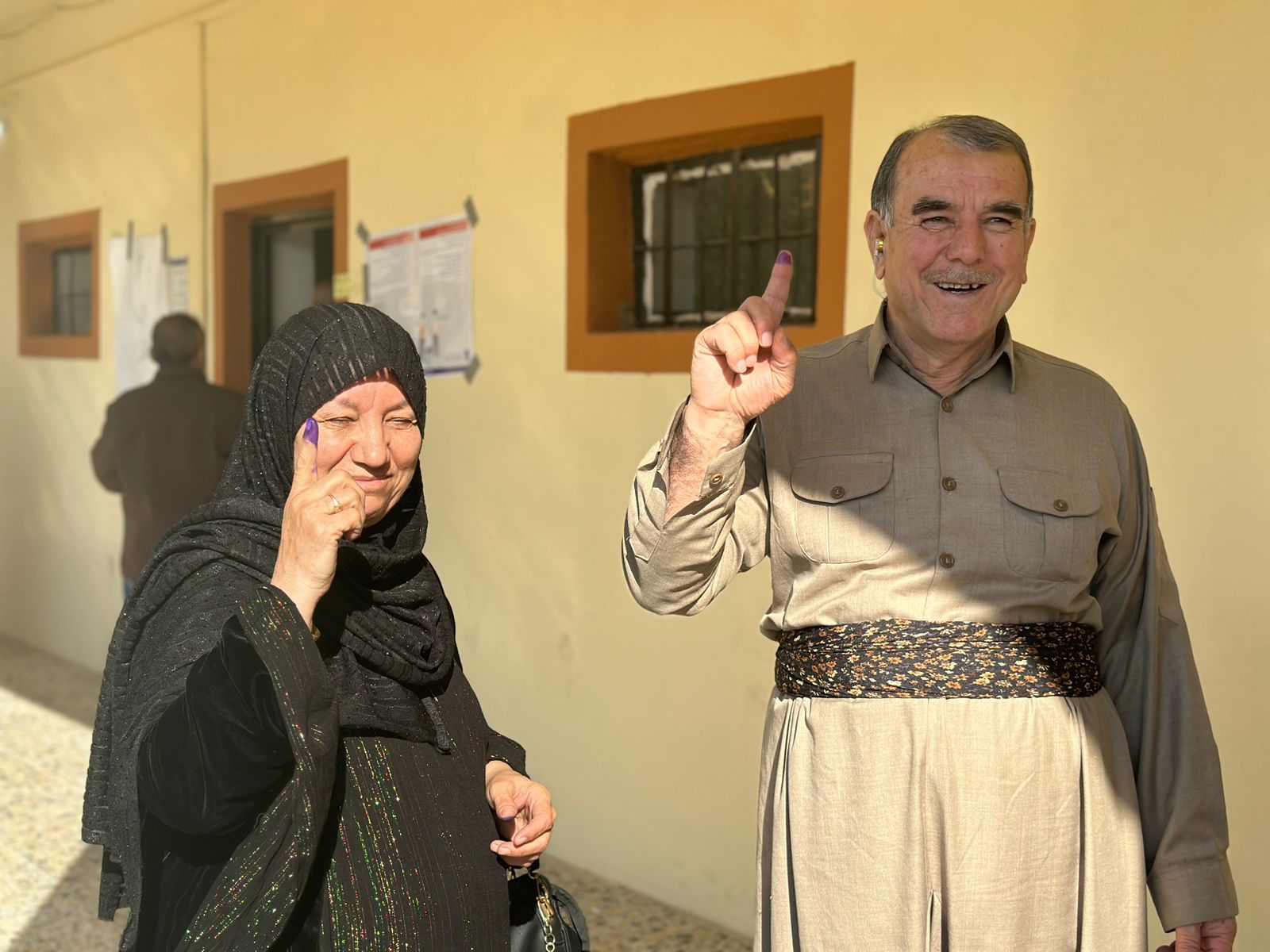
In the 2009 elections, the Kurds won six seats out of a total of 29 seats within the framework of the Kurdistan Alliance, three of which were for the PUK, one seat each for the KDP, the KSP, and the KIU, which was also the third largest force in the council with 21 seats.
Until October 16, 2017, most of the administrative positions in Khanaqin and the security file were occupied by the Kurdish parties, before the forces affiliated with the federal government returned and the Peshmerga forces withdrew due to the repercussions of the independence referendum.
In Saladin, nothing has changed
Out of three candidates for the Kurdish parties in Saladin Governorate, only one candidate won a seat in the provincial council.
According to the preliminary results of the elections, the National Union candidate, Yassin Muhammad Daoudi, received 8,448 votes qualified him to become the owner of the fourth highest number of votes on the list of the national masses that won five seats in the provincial council.
The Kurdish parties failed to ally and did not agree among themselves on a common candidate or candidates, and entered the competition within the framework of other Arab lists.
The PUK included its candidate in the National Masses Alliance, the KDP participated with a female candidate in the National Resolution List, and the Communist Party candidate participated in the presidential list.
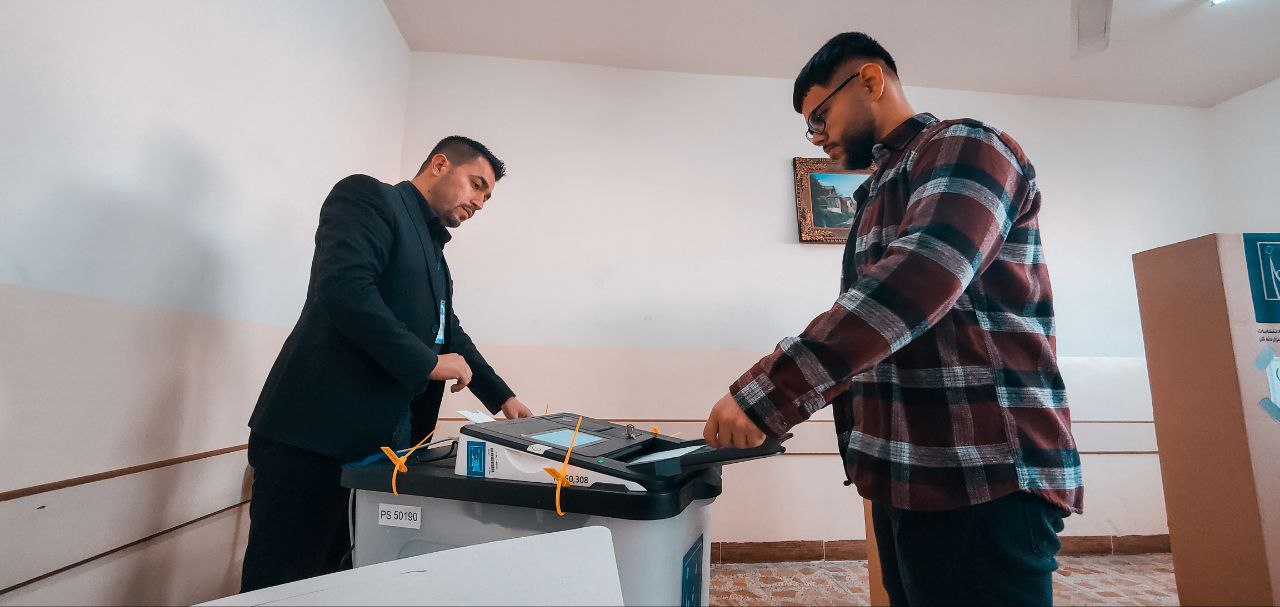
Tara Jalal Daoudi, the candidate of the KDP, was unable to win a seat after collecting 1,171 votes and came in eleventh place on her list, which won two seats.
As for the Communist Party candidate, Hemin Barzan, he received only 620 votes, which did not guarantee him any seat.
The competition between the three Kurdish candidates took place at a time when the number of Kurdish voters in Salah al-Din did not reach 40,000 people, according to unofficial political statistics, out of a total of more than 154,000 residents of Tuz Khurmato district (according to statistics from the Central Bureau of Statistics), which is the only disputed area in the governorate is inhabited by a mixture of Kurds, Turkmens, and Arabs.
In the Salah al-Din Governorate Council elections in 2013, the Kurdish parties won one seat within the framework of the Fraternity and Coexistence Alliance out of a total of 29 seats, and in the 2009 elections, the Kurds succeeded in winning two seats out of a total of 28 seats.
In the Iraqi Parliament elections held in October 2021, the Kurds were able for the first time to win a parliamentary seat in Saladin Governorate (Tuz Khurmatu electoral district) after securing more than 12,000 votes.
The Kurds held the position of mayor of Tuz Khurmatu for several years, but he lost this position and several other positions after the events of October 16, 2017, and part of the population of the Kurdish regions is still displaced.

